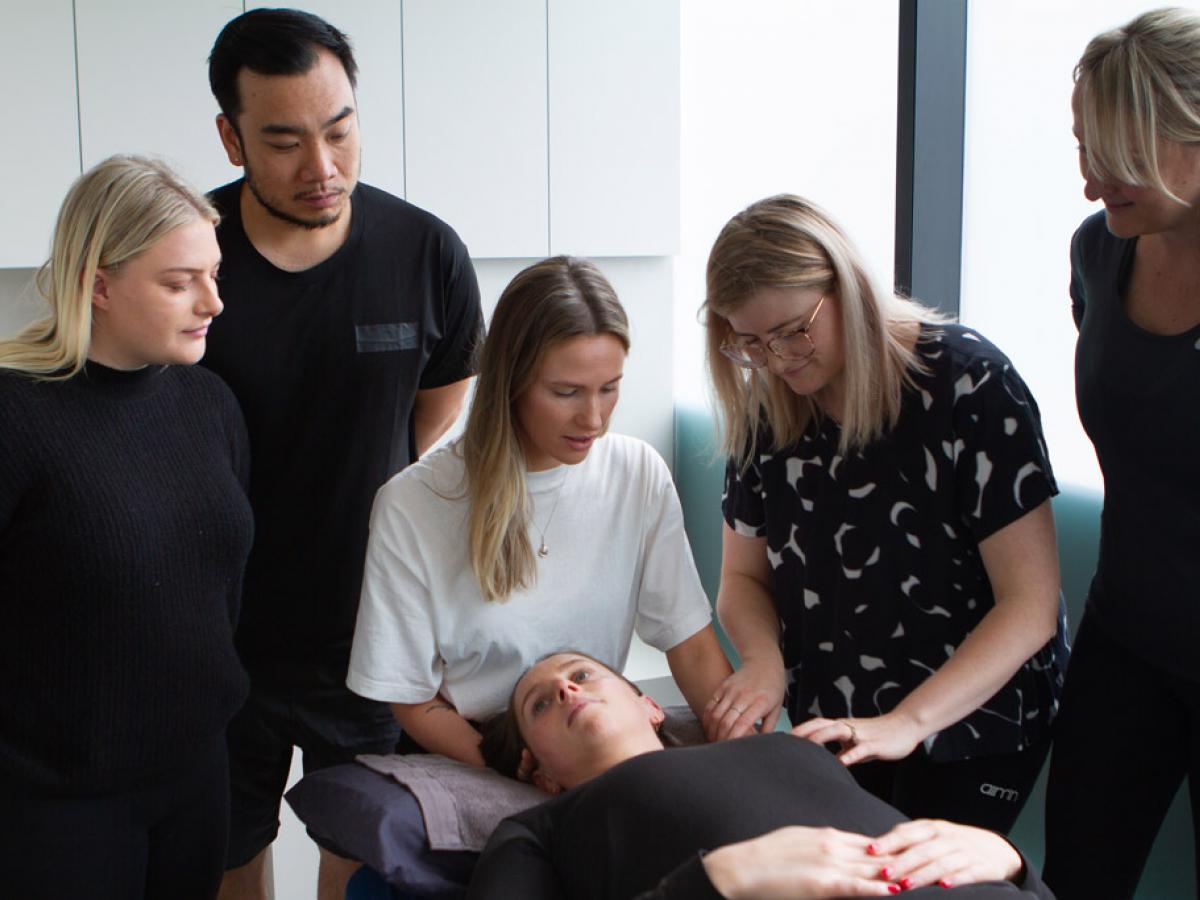Relationship-rich education from the perspective of new academics
Starting to teach in higher education is daunting when education is not your discipline. Relationship building skills honed in professional experience can provide new academics with strong foundations.
Dr Charles Marley, Cameron Dickson, Eliza Huppatz and Sally Morris recently presented at the Festival of Learning and Teaching on the theme of relationship-rich education. Here they share their reflections on enabling relationship-rich learning experiences.
Relationships matter in learning
To be asked to present was an honour; our School – Allied Health Science and Practice – is new, just over three years old, and the smallest school in our faculty. Our teaching team are predominantly new academics making the transition from clinical settings, with a small number of experienced academics supporting the transition. When asked, we felt a little uneasy: what did we know about relationship-rich education given our relative inexperience in academia? Quite a lot it turns out: during our discussions, we realised our professional backgrounds and clinical experience informed an approach underpinned by connection, rapport, trust and care, the hallmarks of relationship-rich education. This article offers reflections on the connection of clinical experience to our approach to teaching.
Building rapport and gaining trust
Cameron Dickson (Physiotherapy)
For many academics, clinical practice is either a current or recent commitment. On reflection, there appears to be numerous common skills and attributes connecting relationship rich education and clinical practice. Pivotal to the latter is the ability to quickly develop rapport with patients and gain their trust, such that the necessary ‘buy in’ to clinical care can begin (be it medical, dental, nursing or allied health). Similarly, maximising student engagement requires this connection – one that necessitates a focus on interpersonal skills and relationships – and the expression of genuine interest in their learning journey.

This requires a shift from seeing oneself as a purveyor of knowledge to one of facilitator of learning and engagement, i.e., with a greater focus on motivating, fostering engagement, and maximising students’ potential.
Simple strategies include providing praise and recognition of achievements, and taking the time to actively listen – make a world of difference. This approach is at the heart of clinical practice - from which (as academics), we may be able to learn a trick or two.
Engage with empathy
Eliza Huppatz (Occupational Therapy)
Occupational therapists use multiple therapeutic modes, intentionally switching between them to meet the unique needs of our clients. In transitioning to academia, I have adapted the use of these therapeutic modes to the non-clinical setting of university to support students experiencing ‘hidden burdens’ that impact their learning. The relational aspect of therapeutic engagement remains the same across clinical and university settings – connection, rapport, trust, and care – but therapeutic modes are realigned to support learning as the specific goal. Consider the example of a student displaying anxiety in the context of presenting their work. In a clinical setting, I may adopt instruction and / or encouragement but the non-clinical setting of the university requires an approach that facilitates engagement with learning as the means to solve the problem rather than direct engagement with the problem. This shift has required critical self-awareness, interpersonal self-discipline, and deep reflection to relearn patterns of responding unique to clinical settings.
Being comfortable with the uncomfortable
Sally Morris (Speech Pathology)
Learning and teaching is messy: everyone has their own baggage which shapes their positionality. Teaching should be about creating the space for exploration, participation and contribution, and this requires us to be attuned to our students, understanding their positionality and how this influences engagement. Students will have preconceptions of the learning experience and I strive to create a learning environment that accommodates these. This draws on skills from my clinical work: connection and rapport are fundamental, and we have to consider the human being in front of us before we can engage fully. I cannot (and do not want to) force learning, but I aim to be consistent in providing the space and opportunity for participation. Even with this relational approach, education can remain challenging and uncomfortable. Creating the space to join and supporting students with this discomfort enables the learning process and, hopefully, growth beyond education.
Hospitality as a guiding ethic
The individual accounts above are informed by unique professional skills, knowledge, and experience. Conceptually, however, we believe they all display an ethic of hospitality. An ethic of hospitality departs from conceptions of hospitality based on reciprocity, in which the guest incurs a debt by accepting hospitality. It is the arrival of the guest that enables the hospitality of the host—it is about giving place to the guest, without knowing which guest will arrive. It is thus a demand for openness to something and someone not possible to foresee.
Applying this to education, hospitality is underpinned by the impossibility of predicting the students that will arrive or what they will need. It demands we do not just cater to different needs, but actively make space for students to contribute on the basis of the differences they bring. It is about being open, welcoming what our students bring, and incorporating this into our teaching practice.
This approach opens us to the unique pressures experienced by our students, and which exert considerable influence on their ability to engage with their studies. By understanding this constellation of experiences, and by making ourselves available for dialogue that is supportive, nurturing, and which displays a genuine interest and concern, we believe learning is transformed from didactic isolated moments, to a continuous, connected, and socially meaningful experience for our students, but also for us as educators.
Authors: Charles Marley, Cameron Dickson, Eliza Huppatz, Sally Morris
A version of this article has recently been published on THE Campus
